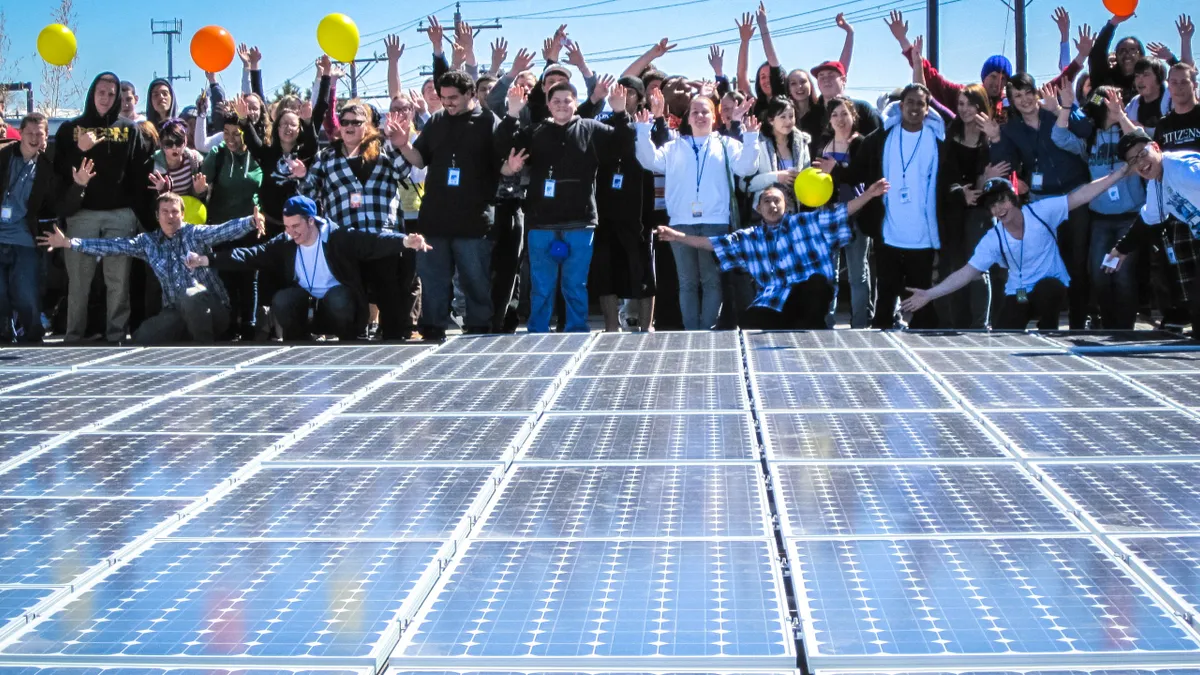Updated June 5, 2019: Gov. Steve Sisolak, D, signed AB 465 on Tuesday.
Dive Brief:
-
Critics of a "solar access program" bill advancing through the Nevada state legislature say it lacks key characteristics of successful community solar programs.
-
AB 465 directs NV Energy to develop three to 10 solar access programs, with a quarter of those programs reserved for low-income customers and half reserved for residential customers unable to install rooftop solar. Opponents say the bill departs from community solar principles better exemplified in a 2017 bill that was vetoed by then-Gov. Brian Sandoval, R.
-
The bill limits solar developers outside of the state's monopoly utility NV Energy from participating in the program and does not specify savings for customers outside the quarter low-income carveout, according to the Coalition for Community Solar Access (CCSA), which opposes the bill for those and other reasons.
Dive Insight:
Community solar legislation is generally developed to help expand solar access to low to middle income customers. Some renewables advocates say the resource could be vital to unlocking U.S. clean energy potential, making effective state policy implementation key.
A July report found the technology could supply 1.7%-2.6% of all U.S. electric power by 2030 if all states were to implement policy-enabled solar markets. But while 42 states have community solar programs, only 19 states have such markets, according to the report written by GTM Research and commissioned by Vote Solar.
"Nevada would benefit from a Community Solar program offered in the state, akin to programs we are seeing nationally, and [we] hope to work with the sponsors and legislators in the future to develop such a program," Sara Birmingham, senior director of state affairs for the Solar Energy Industries Association told Utility Dive in an email, after noting the group "appreciates that this bill will provide benefit to low income customers."
Community solar is "one of the fastest growing sectors of the solar industry," Jeff Cramer, CCSA executive director, told Utility Dive. "And so it's sort of puzzling to understand how a place like Nevada that had so much interest and wanted to become the 20th state [to implement a policy-enabled market], it's puzzling to understand how that train derailed and where those decisions came from."
The 2017 Nevada bill, agreed upon by stakeholders and legislators and introduced by state Sen. Moises Denis, D, would have included several 5 MW community solar projects offered to low-income residential customers, as well as commercial and industrial customers, and would have required savings for all subscribers. But opponents say the new bill does not even qualify as community solar.
Though it requires "electric bill savings" for low income customers, it does not specify a minimum bill savings requirement, nor does it extend those savings requirements to other customers, including apartment or rental customers who cannot install rooftop panels.
"This bill will not provide participants in the program similar benefits to those who install systems on their rooftops, further exacerbating inequities in the electric system," Cramer wrote in a letter to the Nevada Senate Committee on Growth and Infrastructure. "By only offsetting the base tariff energy rate and the deferred energy accounting adjustment, the program will provide substantially less to no savings to customers participating in the program."
The bill also includes solar capacity that has already been approved by the commission, so it allows for repurposed capacity rather than requiring additional deployment. And it prevents non-utility power providers from participating, which opponents say exacerbates the state's monopolized utility model and limits competition.
"Regardless of the market, customers are always, always, better served by more competition," Cramer told Utility Dive in an email. "It decreases risks to ratepayers, increases options and equitable access to customers, and fosters innovation in a market segment traditionally dominated by monopolies."
Nevada is one of several states run by a monopoly utility. Last November, voters shot down a ballot initiative that would have broken up NV Energy's stronghold, after the utility spent $63 million opposing the measure.
The utility said the solar access bill would expand green energy opportunities for customers.
NV Energy "worked collaboratively with the bill's sponsor and many other stakeholders on this expanded solar access program and we are pleased to lend our support," Jennifer Schuricht, a spokesperson from the utility, told Utility Dive in an emailed statement, adding they believe the bill "will provide an opportunity for those who are unable to participate in NV Energy's existing solar programs to go green."
The bill was heard by the Nevada Senate Committee on Growth and Infrastructure on Tuesday.















